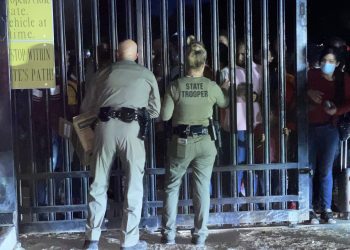DES MOINES, Iowa – Accuracy in Media released a video this week showing undercover journalists talking to several school administrators around the Des Moines Metro, discussing how they have bypassed a new state law.
Gov. Kim Reynolds, in 2021, signed HF 802, a bill that prohibits racial and sex stereotyping and scapegoating in diversity training by local governments and public schools and colleges.
“Critical Race Theory is about labels and stereotypes, not education. It teaches kids that we should judge others based on race, gender or sexual identity, rather than the content of someone’s character,” Reynolds said in a released statement when she signed the bill. “I am proud to have worked with the legislature to promote learning, not discriminatory indoctrination.”
“Race and sex stereotyping” in diversity training are defined in the new law as:
- Ascribing character traits, values, moral and ethical codes, status, or beliefs to a race or sex, or to an individual because of the individual’s race or sex.
- Assigning fault, blame, or bias to a race or sex, or to members of a race or sex because of their race or sex, or claiming that, consciously or unconsciously, and by virtue of persons’ race or sex, members of any race are inherently racist or are inherently inclined to oppress others, or that members of a sex are inherently sexist or inclined to oppress others.
HF 802 explicitly prohibits certain “specifically defined concepts” from diversity training unless their discussion is required for context.
- That one race or sex is inherently better than another race or sex.
- That the United States or the state of Iowa is fundamentally racist or sexist
- By virtue of the individual’s race or sex, an individual is inherently racist, sexist, or oppressive, whether consciously or unconsciously.
- That an individual should be discriminated against or receive adverse treatment solely or partly because of the individual’s race or sex
- That members of one race or sex cannot and should not attempt to treat others without respect to race or sex.
- That an individual’s race or sex necessarily determines an individual’s moral character.
- By virtue of their race or sex, an individual bears responsibility for actions committed in the past by other members of the same race or sex.
- That any individual should feel discomfort, guilt, anguish, or any other form of psychological distress because of that individual’s race or sex
- That meritocracy or traits such as a hard work ethic are racist or sexist or were created by a particular race to oppress another race.
Ryan Williamson, the Coordinator of Equity and Inclusion at Urbandale Community Schools, told the undercover journalists that the new law had not prevented him from teaching what he wanted to teach.
“It hasn’t. It really hasn’t affected us at all. Have we had to shift our language? Absolutely,” he said.
Lindsay Law, the Director of Student Equity at Waukee Community Schools, in response to a question about whether the “stupid law” changed anything, said, “It hasn’t really changed anything.”
“One thing I’m really proud of with our social studies curriculum is we have, for K-5, we have just adopted inquirED, which has a foundation in social justice standards. CASEL (Collaborative for Academic, Social, and Emotional Learning), so a lot of social-emotional learning,” she added.
Anthony Ferguson, the Executive Director of Equity, Inclusion, and Diversity for West Des Moines Community Schools, told the undercover journalists that the law did not change his curriculum at all.
“What I’m proud of, when it comes to curriculum, that we’ve been able to do, we’ve implemented what we call an equity tool, diversity, equity, and inclusion tool, that allows us to, every sort of literature that we’re bringing into the school now, even math, we’re going through this tool. We’re using this tool now, our curriculum development team, to really say, are folks represented in this, you know? Who’s being represented? Who’s being left out of this? And really striving to make that more diverse.
Nikki Roorda, the Associate Superintendent of Teaching & Learning at Johnston Community Schools, discussed how the school district is implementing “diversity, equity and inclusion” into its curriculum.
“We’re doing a curriculum review to make sure that we have, like, Social-Emotional Learning and diversity just infused in the day-to-day, to help inform everybody so that’s something we’re doing,” she said.
These school officials state that the new law has not stopped their efforts.
“802 has not stopped us from talking equity. 802 has not stopped us from talking about bias, both implicit, explicit bias. It hasn’t stopped us from talking about priviledge and what it looks like and sounds like, feels like and how it could show up in classrooms and how our teachers need to be reflective in our own biases. I mean, we’ve done learning in all of our buildings surrounding that,” Williamson said about Urbandale schools. “And we still got a lot more work to do.”
Williamson was asked if he could still teach concepts like systemic racism, and he said they could. Then was asked, “can we teach like systemic racism is inherent in capitalism?”
“Absolutely. We can say that because that’s the truth. That’s based in fact. We can research that,” he responded.
School officials admitted that they are going around the law by relabeling concepts.
“I think we can do a lot of this work without the label and just do the work, right?” Ferguson said. “I know that also rubs some folks the wrong way, if you will, feeling like I might not be pushing hard enough or I may not be just saying the word. You know I’ve been doing this for a while. I don’t have to call it Critical Race Theory to know what we are doing, to know what kind of work that we are doing, where we’re moving the needle, and I don’t have to do that,” Ferguson said, explaining his work in the West Des Moines Community Schools.
Law said Waukee Schools had relabeled concepts to comply with the law.
“You know, we had to go through and had to take out words like ‘privilege’ and write ‘circumstance,'” she said, noting that it’s the same thing and people understand the concept.
Roorda said Johnston Community Schools don’t use “anti-racist” anymore.
“Well, we just talk about cultural acceptance and just, you know, we’re all people,” she said.
Roorda was asked if it was ridiculous that the school district had to change all of the terms.
“It’s the game that we play,” she said.
Law said they can still teach about systemic oppression and social justice in Waukee.
“We’ve been careful around the wording,” she said. “We’ve had to move away from like, ‘supremacy,’ things like that or anything that says white anything in it. But we still use the word ‘oppression.'”
“So we can just relabel it so we can do it?’ Law was asked.
“Yeah, that’s the game,” she replied.
Law said they use terms like “identity.” “It’s kind of watered down for now,” she added. “But then, I think, kids make the connection and they can find their own resources. We can’t just, to the whole class, require a reading that has certain things, certain elements.”
She said they can still offer and suggest it. Law also affirmed that the district still has Learning for Justice material tied to the left-leaning group Southern Poverty Law Center, which has placed mainstream evangelical organizations on their “hate list” for opposing same-sex marriage.
“That’s what our equity standards are built on. We did have to revise the language, so we combed through and took out all of the hot topic words, but it’s still the same,” Law added.
The school officials said they are just getting started.
“Waukee, they’ve got a plan. They’ve got a framework. You know, and what Dr. Law’s doing is wanting to do the same work,” Williamson said. “Politicians really can’t stop it. 802, it’s there. We have to be mindful of it. We just have to shift our language a little bit and how we go about it. When House File 802 was drafted and voted into state law, there was no teeth behind it. There was nothing.”
“Ok, so let’s say you have someone who, you know, goes against House File 802. Then what? Well, for the last year, there was then nothing. So it didn’t have any type of leverage if you will. They had no consequence structure. They had no nothing,” he added.
Law acknowledged current state law does not have consequences and does not know what lawmakers will do to give it teeth.
“It’s like don’t break the law, but there’s no, like, stipulation,” she said. “It’s not like your administrator is going to get fired.”
The different school officials also said they are using Newsela, which has partnered with The 1619 Project.
Law said it was one of their “main go-to’s” at Waukee.
“Yeah, no one has really given us heat,” she added.
Mary Salazar, Director of Teaching and Learning for the Saydel Community School District, said many districts use the service.
She acknowledged that it was a way schools districts could bring in elements opponents would identify as critical race theory into the schools.
An unidentified staff member said if “they” (opponents, called wackos by the undercover journalist that solicited laughter) found out, they would have to “switch it up.”
Salazar said school libraries could offer resources like this for students to peruse.
Williamson said Urbandale is looking at Newsela and how they can bring some of that curriculum into the schools.
He added that State Rep. Ruth Ann Gaines, D-Des Moines, has suggested that schools require a Black History class.
“That way you could probably touch on 1619 without calling it 1619,” Williamson said.
“You have to shift your language now, because if you’re not people are going to start going back to House File 802,” he said.















